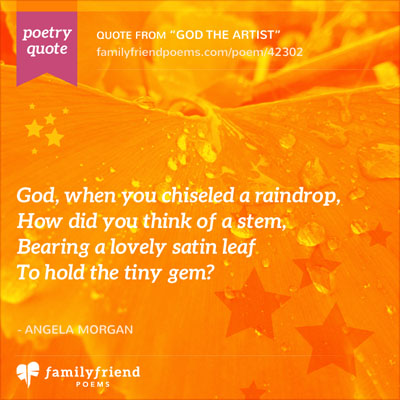The Industrial Revolution took place in Great Britain during the late 1700s and early 1800s. As cities grew, living conditions deteriorated for the poor and working class. Factories and mass production were beneficial for some but not everyone. This poem stands in contrast of new manufacturing processes of that time period by focusing on nature. The narrator in this poem, the brook, is personified. The brook shows persistence by continuing to flow, no matter what obstacles get in its way. The repeated lines, “For men may come and men may go, but I go on for ever,” showcase that. Famous poet Alfred Tennyson (1809-1892) was named Poet Laureate in Great Britain and Ireland.
Famous Poem
I come from haunts of coot and hern,
I make a sudden sally
And sparkle out among the fern,
To bicker down a valley.
I come from haunts of coot and hern,
I make a sudden sally
And sparkle out among the fern,
To bicker down a valley.
By thirty hills I hurry down,
Or slip between the ridges,
By twenty thorpes, a little town,
And half a hundred bridges.
Till last by Philip's farm I flow
To join the brimming river,
For men may come and men may go,
But I go on for ever.
I chatter over stony ways,
In little sharps and trebles,
I bubble into eddying bays,
I babble on the pebbles.
With many a curve my banks I fret
By many a field and fallow,
And many a fairy foreland set
With willow-weed and mallow.
I chatter, chatter, as I flow
To join the brimming river,
For men may come and men may go,
But I go on for ever.
I wind about, and in and out,
With here a blossom sailing,
And here and there a lusty trout,
And here and there a grayling,
And here and there a foamy flake
Upon me, as I travel
With many a silvery waterbreak
Above the golden gravel,
And draw them all along, and flow
To join the brimming river
For men may come and men may go,
But I go on for ever.
I steal by lawns and grassy plots,
I slide by hazel covers;
I move the sweet forget-me-nots
That grow for happy lovers.
I slip, I slide, I gloom, I glance,
Among my skimming swallows;
I make the netted sunbeam dance
Against my sandy shallows.
I murmur under moon and stars
In brambly wildernesses;
I linger by my shingly bars;
I loiter round my cresses;
And out again I curve and flow
To join the brimming river,
For men may come and men may go,
But I go on for ever.
More...
Go To Complete Poem
Featured Shared Story
I was read poetry to my mother born 1929 in faraway Colombo, Sri Lanka. She loved this poem, and I remember her animated voice bringing the words hidden in the babbling brook to life and the...
Read complete story
Touched by the poem? Share your story! (2)



 Environment Poems
Environment Poems Nature Beauty Poems
Nature Beauty Poems Flower Poems
Flower Poems Garden Poems
Garden Poems Spiritual Nature Poems
Spiritual Nature Poems Beach Poems
Beach Poems